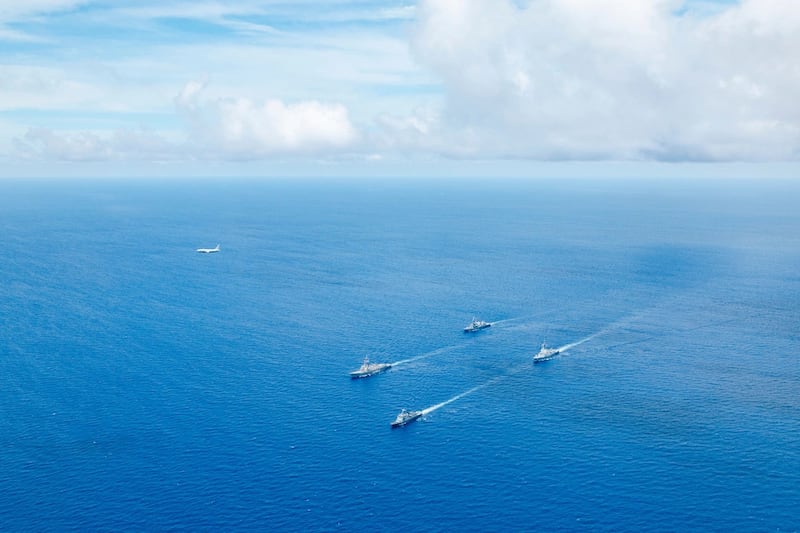So-called freedom of navigation operations, or FONOPs, that the U.S. Navy has been carrying out against China’s extensive maritime claims in the South China Sea, have proved ineffective and even risk escalating tensions, Australian research found.
The findings, in the paper “Don’t Shoot the Messenger: Perception & Misperception in the South China Sea,” by Nell Bennett, are part of the Blue Security program, a collaboration between various Australian universities and institutes.
Bennett, a researcher specializing in maritime and naval affairs, looked into the FONOP program between 2016 and 2023 when, in her opinion, the U.S. made the South China Sea a focus and directed its attention towards China’s maritime claims there.
“The seven-year FONOP program has seen China go from measured rejection of U.S. messages to more explicit hostility,” Bennett said in the report.
“China did not accept the messages that the U.S. sought to send through its FONOP program,” she said, adding that as China’s behavior remains unaltered and becomes even more belligerent, the FONOPs are deemed unsuccessful.
‘Strategic communication’
Freedom of navigation, according to the U.N. Convention on the Law of the Sea , or UNCLOS, is the right of all states to sail the high seas, as well as to fly over them, without interference from other states.
Since 1979, the United States has conducted FONOPs to uphold UNCLOS provisions and reject “unlawful attempts by coastal states to restrict the rights and freedoms of navigation and overflight as well as other lawful uses of the sea,” as defined by the Pentagon.

The U.S. campaign shows that the United States “does not acquiesce to the excessive maritime claims by other nations and prevents them from becoming accepted customary international law,” the Department of Defense said in an annual report.
Since the end of 2015, U.S. naval ships regularly sailed near disputed features in the South China Sea, as well as in the Taiwan Strait, to challenge the claims by not only China but also by others, such as Vietnam, Malaysia and Taiwan, that the U.S. views as inconsistent with UNCLOS.
The report’s author considered FONOPs a form of strategic communication, or “messages that are communicated to advance a strategic objective.”
“The idea is that the state will receive the message and either reconsider or change its course of action,” Bennett wrote.
However, despite the 46 reported FONOPs in the South China Sea from 2016 to 2023, “China’s responses became more oppositional over time.”
“Not only did China use U.S. actions as justification for its own militarization, but it also made a thinly veiled threat of retaliation,” the researcher said, citing statements by Chinese military officials and media reports.
The key factor that will determine whether a message will be accepted is the pre-existing relationship between the states, Bennett argued, and as China viewed the U.S. as a competitor and potential threat, it was predisposed to reject the U.S. communication, which is unlikely to bring about any change in Beijing’s behavior.
“This argument actually has been floating around since FONOPs started,” said Collin Koh, senior fellow at the S. Rajaratnam School of International Studies in Singapore, who recorded every FONOP by U.S. and allied vessels in the region.
“I think the whole idea, firstly, is to let China know it’s time to roll back on its excessive maritime claims, but nobody has realistically expected to achieve Beijing’s rolling back so it is a bit hasty to say it’s unsuccessful,” Koh told Radio Free Asia.
China would still conduct land reclamation and military exercises to exert control according to its plans and strategies, but the U.S. FONOPs had helped to deter Beijing’s “gray zone” campaign of coercive pressure, he added.
“An in-depth study is needed to reach conclusions,” Koh said.
Somebody cares
In Koh’s opinion, the U.S. strategic messaging is also intended to reassure countries in the region about Washington’s stabilizing role, “that is to say that there is somebody who cares.”
“At least one country acts for public common good and its actions should be appreciated by all countries facing China’s aggression,” Koh said.

“I don’t think FONOPs are designed to stop Chinese aggression,” said Malcolm Davis, a senior analyst at the Australian Strategic Policy Institute, or ASPI, a government think tank.
“They are there to demonstrate to Beijing that the U.S. maintains the right to sail in international waters and challenges China’s illegal claims to territory.”
Only China has publicly and officially protested against the U.S. FONOPs that it sees as disruptive and “a grave threat to China’s sovereignty and security.”
RELATED STORIES
China holds drills as Philippines, US conduct exercise in South China Sea
US, Canadian warships conduct joint drills in South China Sea
Philippines, US, Japan stage joint naval maneuvers in South China Sea
In her research, Bennett also noticed that the Philippines remained supportive of U.S. messaging and its media “even adopted the rhetoric and justifications that the U.S. provided in support of the operations.”
“Many would argue that [without the FONOPs] it would be more challenging to send clear, consistent messages to Beijing regarding international law and territorial disputes in the South China Sea,” said Troy Lee-Brown, project manager of Blue Security and co-editor of Blue Security Maritime Affairs Series.
“However, ultimately, as the author Nell Bennett points out, the effectiveness of FONOPs depends on how they are perceived.”
“So, there is a tension there between the two points of view on their efficacy,” Lee-Brown told RFA.
Lee-Brown suggested that FONOPs “should ideally be complemented by other forms of strategic communication” – diplomatically, through statements and declarations, military presence and exercises with partners and allies, and legal and normative advocacy amongst other aspects.

Analysts also pointed out that the U.S. not being a party to UNCLOS presents challenges to its advocating a rules-based order in the South China Sea.
“However, the U.S. has consistently observed UNCLOS as customary international law and conducts operations in accordance with its principles,” Lee-Brown added.
ASPI’s Malcolm Davis said it’s important that the U.S. maintains FONOPs and “it’s also important that other U.S. allies participate in one way or another, or, like Australia, undertake similar operations to demonstrate international law at sea.”
Edited by Mike Firn.
